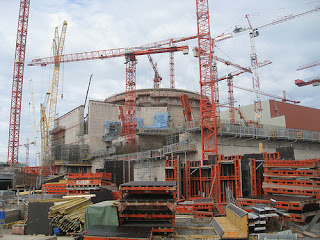 |
| Areva's European Pressurised Reactor Olkiluoto 3 is now over five years behind schedule. Its design faces 28 unanswered questions from the UK regulator. |
EDF and Areva are facing delays, high costs, and problems satisfying the regulator, over trying to get their flagship European Pressurised Reactor nuclear plant design approved for building in the UK, even as EDF seeks a £165/MWh price guarantee from the Government.
The two companies have resolved just three of the 31 problems blocking their proposed nuclear reactor from receiving environmental and safety approval from the Environment Agency and the Office of Nuclear Regulation (ONR).
They are greatly behind schedule and will not receive final approval this year, as they had hoped.
Their design for a new generation European Pressurised Reactor (EPR) has to pass through the generic design assessment (GDA) process before any reactors can be built.
EDF is hoping to use two of the reactors in a 3.2 gigawatt plant at Hinkley Point, Somerset.
Meanwhile, it is seeking a subsidy in the form of a guaranteed price of £165 per megawatt hour (MWh) for electricity from the plant from the Department for Energy and Climate Change (DECC) and the Treasury, according to the Times newspaper.
This expensive figure is more than the £150/MWh strike price estimated by Dr. David Toke, Senior Lecturer in Energy Policy at the University of Birmingham, and about the same as a £166/MWh estimate by Citi bank analyst, Peter Atherton.
The EPR design was given interim approval by the ONR and the Environment Agency last December but EDF has to come up with answers to 31 separate questions.
They cover issues such as security, reliability, strength of the inner containment wall, test results, and independent assessment of predictive calculations.
Significantly, the report says: “some of the deliverables have been late or did not provide the required quality of arguments or evidence".
It adds: "a number of the metrics are amber or red, indicating that, if no action is taken to improve matters, it is unlikely that the GDA [Generic Design Approval] Issues will be closed-out on the timescales indicated in the current resolution plans", in other words that the design will receive approval by November. EDF and Areva are reviewing their timescales and a new date will be announced shortly.
ONR takes a while to make its progress reports publicly available. Although published on July 5, the latest quarterly report actually covers the three months up to March 31. The reports are not easy to find on the website, especially because a link leading to them is broken.
The EPR is now the only reactor design being assessed following Westinghouse's withdrawal from the market with its AP1000 reactor design.
More EPR delays
To add to the two French companies' woes, the reactor being built by Areva in Finland, the 1,600 megawatt Olkiluoto 3, will now “not be ready for a normal level of electricity production in 2014" according to a statement issued on Monday by Areva's partner, the Finnish utility Teollisuuden Voima Oyj (TVO). TVO adds, dryly: “we are not pleased with the situation".It was supposed to have been ready in 2009, and last year TVO said it would start in 2014. It is more than €2 billion over budget. TVO is locked in a bitter legal wrangle with Areva.
There are similar delays and cost overruns at Areva's EPR project in Flamanville, France.
The nuclear subsidy dilemma
Under the draft Energy Bill, the Government will introduce ‘contracts for difference’, a tariff system intended to subsidise renewables, nuclear, and carbon capture and storage. But it will not be in place until 2014, two years after EDF says it needs to make an investment decision on the Hinkley Point plant.The EPR clearly is much more expensive than EDF had originally said publicly. The Government has repeatedly said it is committed to nuclear power.
Offshore wind power is currently subsidised at a price of £130 per MWh under the Renewables Obligation Commitment. The Secretary of State, Ed Davey told the House of Commons Select Committee on Energy and Climate Change yesterday that details of changes to the Renewables Obligation Commitment subsidy levels, which had been expected to include a reduction in this subsidy and were anticipated this week, have been delayed due to pressure of time impacting on his department’s discussions with the Treasury and other departments.
He said “there are over 4,000 responses to the consultation, and it is very complicated”. Pressed by MPs, he said an announcement will be made by the end of September. He also denied that there was any outside interference in the decision-making process.
Regarding the issue of a subsidy for nuclear power, Ed Davey, is on record as saying: “There will be no levy, direct payment or market support for electricity supplied or capacity provided by a private sector new nuclear operator, unless similar support is also made available more widely to other types of generation.
"I want to make clear … that this means that nuclear will not receive a higher price than comparable generation technologies whether they be renewables or indeed gas generation, once its emissions have been abated by carbon capture and storage.”
No comments:
Post a Comment